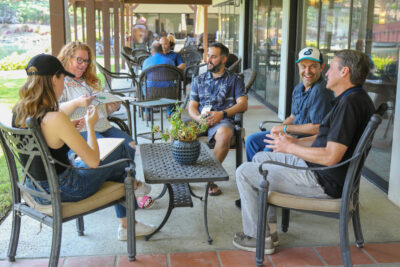
3 Tips for Finding Friends as a Pastor
It’s so important for pastors to develop friendships but that can be difficult. Carey Nieuwhof shares 3 tips for making friends as a church leader.
Every pastor should cultivate close, meaningful relationships with their staff. But if someone works for you, that limits how far your friendship can go and how much of your life you can share. Who do you talk to about your personal struggles? Who do you turn to when you need advice, or when you’re thinking about making big transitions in your life?
At last year’s Summit conference, Pastor Carey Nieuwhof talked about why it’s so important for pastors to develop friendships, and he shared some tips for making friends as a church leader.
Here are three tips for finding friends as a pastor.
1. Look beyond your staff
Carey’s rule for pastor friends is “You don’t work for them, and they don’t work for you.” You should absolutely be friends with your staff. But when one of you works for the other, that’s automatically going to change the dynamics of the relationship. There are going to be situations and topics that may not be appropriate to discuss, or where one of you can’t express what you really think or feel. Even when you have a great friendship, one of you is still “the boss.”
Carey says with these relationships, “You can go to about 90 to 95 percent of the places you need to go, but you’ve always got that funk where you’re kinda . . . their boss.”
So it’s important that you make a point of forming friendships with people outside of your organization, too, so that you can share the parts of your life that your staff can’t relate to or that you shouldn’t bring to them.
2. Seek out other leaders
One of the reasons Carey recommends pastors look beyond their own staff is that if someone works for you, and they’ve never served in your role before, there are naturally going to be aspects of your job and your personal challenges that they simply won’t be able to relate to. No matter how close you are with your staff, you need to make sure you have relationships you can turn to when you need help navigating your own leadership challenges.
That may be a fellow pastor from a neighboring church. It might be someone who leads a much larger organization than you do. If you intentionally develop friendships with people who have more experience than you do, then they’ll be a lot more likely to have insights you can apply to your own situation, and you’ll be better equipped to lead your church well.
3. Know the difference between solitude and isolation
As a pastor, your job can be relationally exhausting. You may be comforting people through difficult seasons of life, counseling them while they share their darkest thoughts and deepest struggles, navigating the logistics of loving your enemies, and equipping your staff to handle their own leadership challenges.
And that’s where solitude can be incredibly restoring. It allows God to speak in the silence and move in the stillness. It gives your mind, body, and spirit time to recover, heal, and prepare for what’s next.
But Carey warns, “That need for solitude is really good, but don’t let it bleed into isolation.” Alone time is valuable and important, but don’t let your need to recharge prevent you from spending quality time with friends and people who build you up.
Get more great insights from the Summit
Every year, Pushpay invites leaders like Pastor Carey Nieuwhof to discuss some of the most pressing topics facing today’s ministry staff. Right now you can watch the complete videos from each of our session speakers for free.






